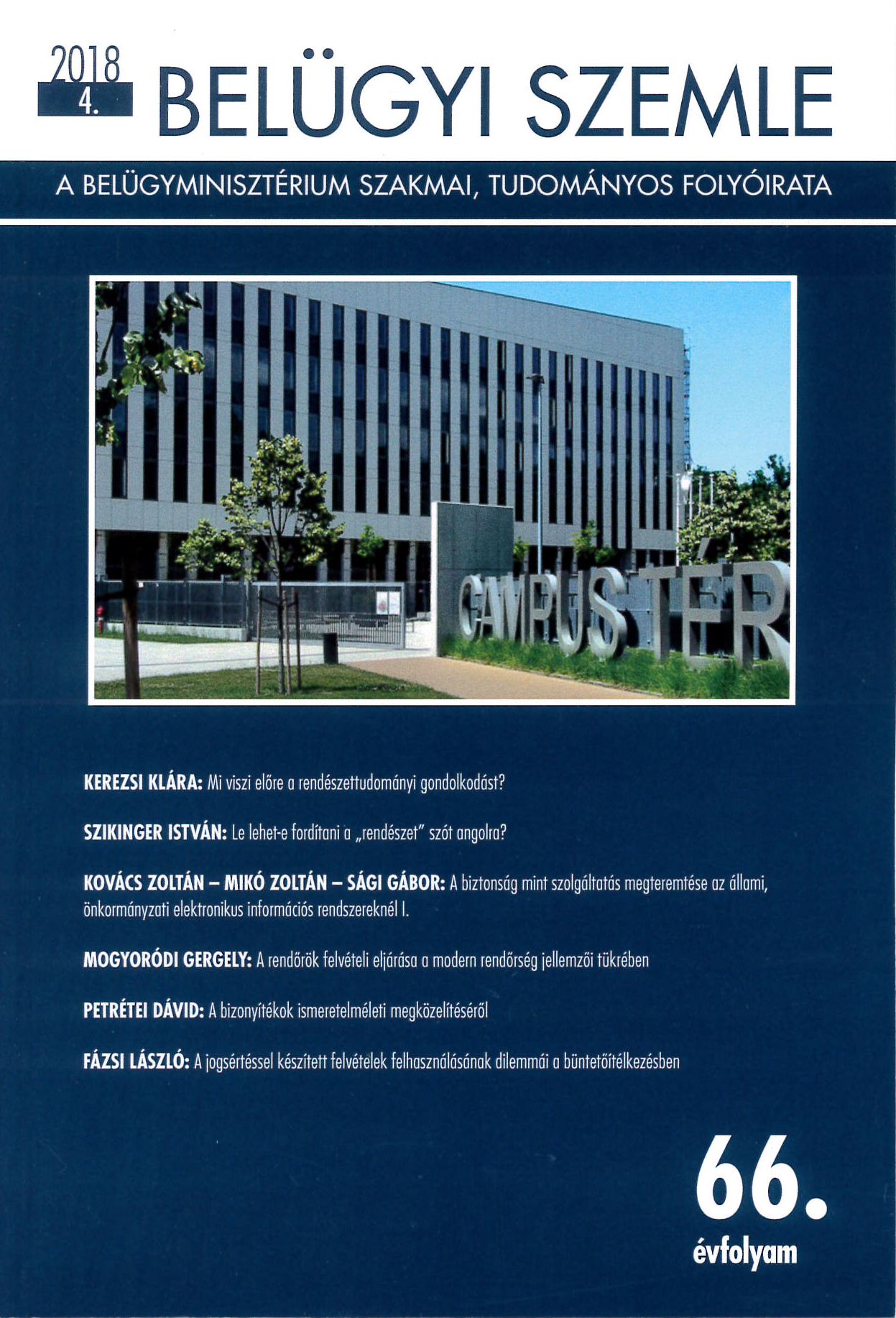Keywords
epistemology
evidence
forensics
evidence
forensics
How to Cite
About knowledge theoretical access of evidences. (2018). Academic Journal of Internal Affairs, 66(4), 53-72. https://doi.org/10.38146/BSZ.2018.4.5
Abstract
The professional literature knows about logical, processual, psychic and knowledge theoratical access for the determination of evidence. This paper intends to present first of all the knowledge theoretical access but with addition of other aspects, too. Criminalistic is a recognition activity. One of the most important factors of recognition is knowledge or science. The Platonic definition of knowledge is the proved true faith. (Not to confuse it with religious faith or with any things believed, we could also say conviction instead of that.) The condition of proving can protect us to consider random lucky hits of truth as knowledge.
Downloads
Download data is not yet available.
Similar Articles
- Eszter Neubrandt, Experts in the investigative process , Academic Journal of Internal Affairs: Vol. 61 No. 7-8 (2013)
- István Fazekas, AI research in forensic sciences , Academic Journal of Internal Affairs: Vol. 66 No. 7-8 (2018)
- Tibor Gaál, The increasing role of digital evidence in criminal procedure , Academic Journal of Internal Affairs: Vol. 66 No. 7-8 (2018)
- Csaba Fenyvesi, Presentation for recognition and faith , Academic Journal of Internal Affairs: Vol. 66 No. 4 (2018)
- Csaba Fenyvesi, Jack the Ripper and modern forensic methods , Academic Journal of Internal Affairs: Vol. 65 No. 7-8 (2017)
- József Orbán, Introduction to the application of likelihood in forensic science , Academic Journal of Internal Affairs: Vol. 65 No. 2 (2017)
- Kinga Sorbán, Digital evidence in criminal procedures , Academic Journal of Internal Affairs: Vol. 64 No. 11 (2016)
- Balázs László, Detection and examination in a forgotten bill of Criminal Code , Academic Journal of Internal Affairs: Vol. 69 No. 7 (2021)
- Gábor Kovács, Forensic Sciences Under Siege , Academic Journal of Internal Affairs: Vol. 69 No. 10 (2021)
- András Horváth, The importance of textile strings in a traffic violation , Academic Journal of Internal Affairs: Vol. 64 No. 6 (2016)
You may also start an advanced similarity search for this article.
Most read articles by the same author(s)
- Márton Lontai, Horolma Pamzsav, Dávid Petrétei, Artificial Intelligence in Forensic Sciences Revolution or Invasion? , Academic Journal of Internal Affairs: Vol. 72 No. 4 (2024)
- Dávid Petrétei, Criminalistics, police science, forensic sciences – reflections on the anniversary of the Hungarian Association of Police Science , Academic Journal of Internal Affairs: Vol. 72 No. 5 (2024)
- Márton Lontai, Horolma Pamzsav, Dávid Petrétei, Artificial Intelligence in Forensic Sciences Revolution or Invasion? Part II , Academic Journal of Internal Affairs: Vol. 72 No. 8 (2024)
- Márton Lontai, Horolma Pamjav, Dávid Petrétei, Artificial Intelligence in Forensic Sciences Revolution or Invasion? Part II , Academic Journal of Internal Affairs: Vol. 72 No. 8 (2024)
- Dávid Petrétei, Criminalistics, police science, forensic sciences – reflections on the anniversary of the Hungarian Association of Police Science , Academic Journal of Internal Affairs: Vol. 72 No. 5 (2024)
- Dávid Petrétei, The Future of the Criminalistics, the Criminalistics of the Future , Academic Journal of Internal Affairs: Vol. 62 No. 10 (2014)
- Dávid Petrétei, Theoretical Issues of Forensic Identification , Academic Journal of Internal Affairs: Vol. 68 No. 2 (2020)
- Dávid Petrétei, Theoretical Issues of the Trace and Pattern Evidences in the 21th Century , Academic Journal of Internal Affairs: Vol. 70 No. 5 (2022)
- Dávid Petrétei, Print development from human skin , Academic Journal of Internal Affairs: Vol. 63 No. 11 (2015)
- Dávid Petrétei , Modern Methods of Latent Print Development I - Physical Methods , Academic Journal of Internal Affairs: Vol. 71 No. 4 (2023)

